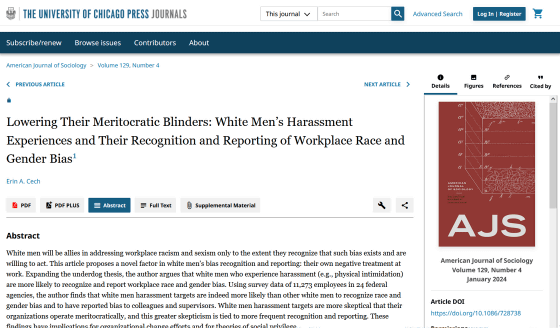White men who experience unfair treatment at work are more likely to question organizational fairness and report workplace harassment.

To eradicate workplace harassment, it is important that people around you notice and report it. A paper published in the academic journal American Journal of Sociology in 2024 showed that 'white men who have experienced unfair treatment at work are more likely to notice and report harassment in the workplace.'
Lowering Their Meritocratic Blinders: White Men's Harassment Experiences and Their Recognition and Reporting of Workplace Race and Gender Bias1 | American Journal of Sociology: Vol 129, No 4

White men who have been mistreated at work are more likely to notice and report harassment − new research
https://theconversation.com/white-men-who-have-been-mistreated-at-work-are-more-likely-to-notice-and-report-harassment-new-research-234528
Erin Chafe , an associate professor of sociology at the University of Michigan who studies workplace inequality, hypothesized that for white American men, how they are treated in the workplace may be related to their perceptions of sexist and racist incidents that harm their coworkers.
To investigate this hypothesis, Cech analyzed data on federal employees employed by 28 government agencies that was collected to investigate government efforts to eliminate personnel policy violations. The data included a total of 11,000 federal employees, of whom 5,011 were white men.
Analysis of the data showed that while white men experienced bullying, intimidation or other harassment less frequently than women and people of color, roughly one in three had experienced it in the past two years, while 44% of white women, 49% of women of color and 35% of men of color had experienced some form of harassment during the same period.
The study found that white men who were targets of harassment were 70% more likely to recognize sexist bias and 58% more likely to recognize racial or ethnic bias in their coworkers than their non-harassed counterparts, and were about twice as likely to report gender or racial bias to their supervisors or coworkers.

When asked why white men who have experienced harassment are more sensitive to prejudice in the workplace, Cech argues that it may be because they are skeptical of the idea that 'organizations are functioning fairly.'
For example, only one-third of white men who had experienced harassment agreed with the statement, 'My organization recognizes and rewards people based on their performance,' compared with two-thirds of white men who had not experienced harassment.
A key point Cech makes is that white men are more likely to recognize harassment in others, regardless of the reason for their own harassment: whether it was due to social characteristics like age, religion, or sexual identity, or whether it was a personality conflict, white men who experienced harassment were more skeptical of organizations and more aware of harassment.

Cech said many white men believe their workplaces are run rationally, that 'those who are good at their jobs get promoted, and those who aren't get demoted or fired.' However, in reality, racial and gender discrimination is common in the United States, with about 40% of women experiencing sexism and 41% of black workers experiencing racial discrimination at some point in their careers.
To eradicate gender and racial discrimination from the workplace, we need the support of the majority of white men. 'In recent years, there have been many efforts to identify the best strategies for reducing prejudice in the workplace. My findings suggest that encouraging white men to reflect on their own negative experiences in the workplace may make it easier for them to recognize unfair treatment by their colleagues,' said Cech.
Related Posts:
in Science, Posted by log1h_ik







